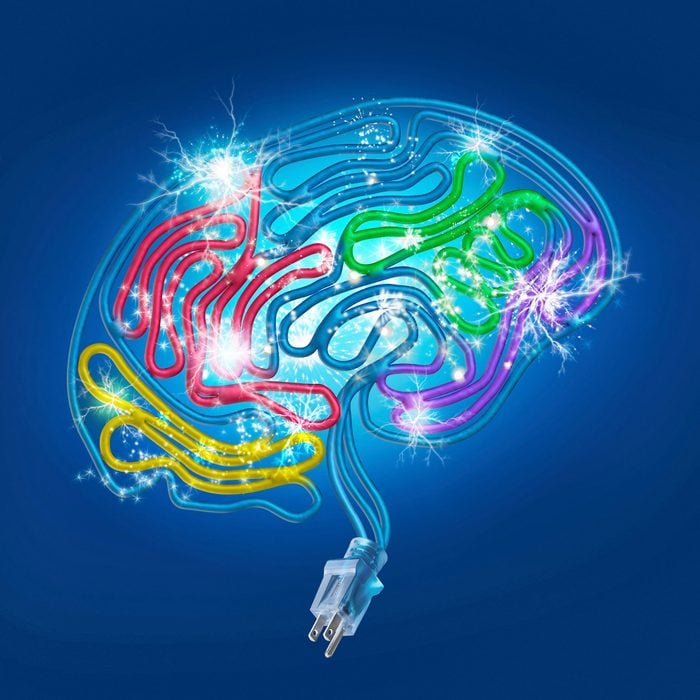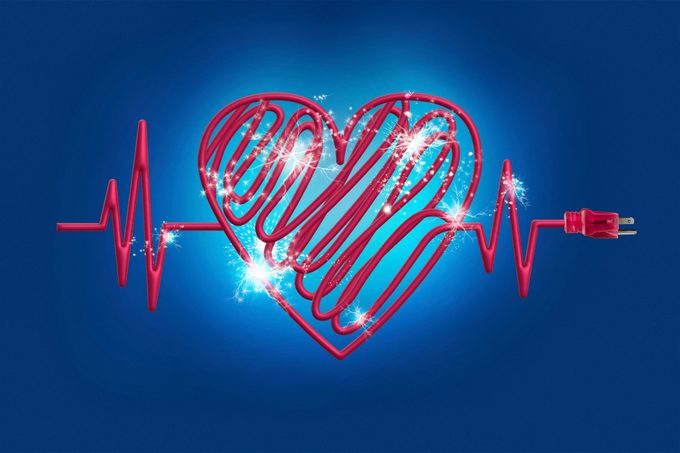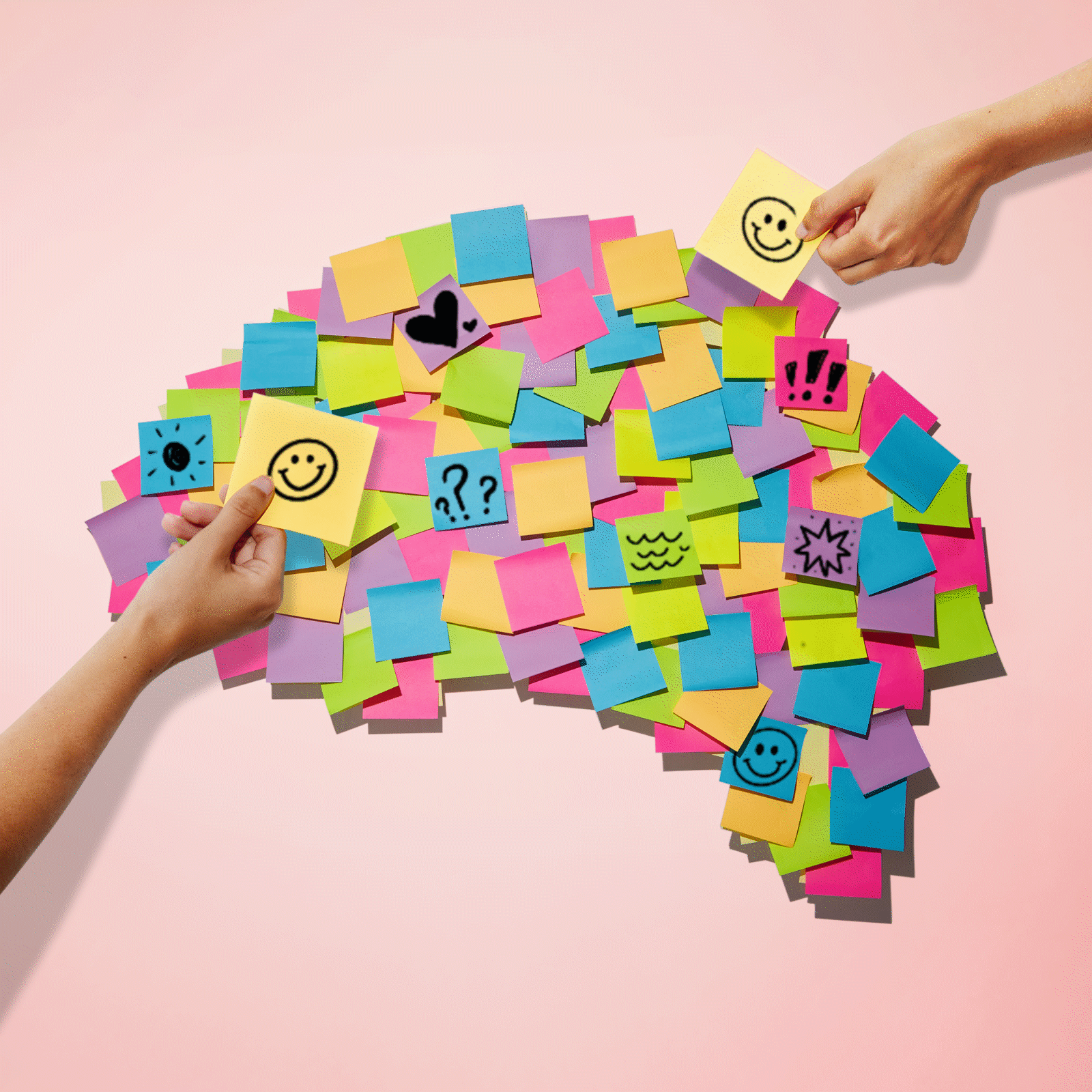How to Improve Your Memory and Boost Your Brain Power
Updated: Aug. 16, 2023

Stop forgetting your car keys and your friends' birthdays for good!
The last time my husband and I went out for an elegant restaurant dinner, the server came to our table and began to recite a long list of specials, with detailed descriptions of how the dishes were made and where the ingredients had been sourced. Her recitation went on and on, and as she spoke I became almost more interested in how she could remember all those descriptions than I was in the food. Meanwhile, I couldn’t remember where I’d put my keys before we left for the restaurant.
The good news is that not remembering where you put your keys is generally not a sign of incipient dementia. And on the flip side, being able to remember a long list of restaurant specials isn’t necessarily a sign of extraordinary mental ability either. Memory is far more complicated than these two examples could ever show, and there’s a wide range of what’s considered normal.
While most of us are terrified about developing dementia, fewer than 10% of adults age 65 and older will wind up with dementia such as Alzheimer’s.
“Developing a neurodegenerative condition like Alzheimer’s is not what we consider healthy, normal aging,” says Joel Salinas, MD, behavioral neurologist at NYU Langone Health and chief medical officer of Isaac Health, a memory clinic. While some memory loss is normal as people age, he says, “it’s not the kind of decline that interferes with the ability to live your life.” And, he adds, “there are areas that actually improve with age. Vocabulary is one. The other is theory of mind and perspective taking … what some people call wisdom.”
Jessica Zwerling, MD, director of the Center of Excellence for Alzheimer’s Disease at the Albert Einstein College of Medicine in New York, compares the effect of aging on memory as “kind of like getting traffic on the brain. It may take longer to retrieve a word; it may come to you later. The speed of processing can go down, but your hippocampus [the part of the brain most associated with memory] should be functioning.”
The hippocampus is where memories are created and cataloged, but it doesn’t work alone. The amygdala, next to the hippocampus, singles out certain memories as being important. And the memories themselves are stored in various sections of the cerebral cortex, the outer layer of the brain.
“Memory is all these different brain networks working in concert with each other,” says Dr. Salinas.
While genetics and family history play some role in the risk of memory problems, so do plenty of other factors. Addressing any of these may make your memory sharper.
The brain might be the place that memories are stored, but it doesn’t exist in a vacuum. The health and efficiency of the brain depend a lot on the general health of the body. To put it succinctly: What’s good for the body is good for the brain. Many of the lifestyle factors that can boost memory also have a positive effect on general health. Taking steps to improve your lifestyle in any of the following four areas will help keep your mind sharp and your body strong.
Exercise

Regular physical exercise doesn’t just build muscles and keep weight in check. It also protects memory and thinking skills.
“Exercise helps improve blood vessel health and blood flow. That helps with the activity of brain cells and also helps reduce the risk of brain inflammation,” says Dr. Salinas. “It also helps brain cells repair themselves and their connections to other brain cells.”
Studies bear this out. Research at the University of British Columbia found that regular aerobic exercise, the kind that increases your heart rate, also increases the size of the brain’s hippocampus. And a University of Maryland study found that memory improved in both cognitively healthy older adults and those with mild cognitive impairment after a 12-week exercise program.
If you’re not into running or even fast walking, how about dancing? It turns out that taking a dance class may be one of the best activities you can do for your brain. Dr. Zwerling’s colleagues at the Albert Einstein School of Medicine looked at the effects of physical activity on preventing cognitive decline and memory loss, and they found that ballroom dancing was particularly effective. At the University of Illinois at Chicago, a Latin ballroom dance program for older sedentary adults had similar results, finding improvements in memory, attention and focus.
“Dancing combines physical activity, learning something new and social engagement,” says Dr. Salinas. “The more of these factors an activity has, the better off you’ll be.”
Diet

Many people probably recall their mothers telling them to eat fish “because it’s brain food.” I remember when I learned in school that the brain actually runs on glucose, which is a form of sugar. “Aha!” I told my mother. “Fish isn’t brain food. Chocolate is brain food!” My mother didn’t buy it, and she was right. While the brain does run on glucose, it’s healthier for body and brain to get sugar from fruits and vegetables, not from products with added sugars like sweet pastries and candy. Too much sugar restricts blood flow to the brain and can even cause brain atrophy.
The real brain foods are those that reduce inflammation and promote cardiovascular health. In 2015, doctors from Rush University Medical Center and the Harvard Chan School of Public Health published an eating plan aimed at preserving cognitive function. Called the MIND (Mediterranean-DASH Intervention for Neurodegenerative Delay) diet, it’s a hybrid of the Mediterranean and DASH (Dietary Approaches to Stop Hypertension) diets. The MIND diet emphasizes brain-healthy foods such as whole grains, vegetables, nuts, beans, berries, poultry and fish (yes, Mom was right!).
Sweets, sadly, are on the brain-unhealthy foods list, along with foods high in saturated and trans fats, including red meat, cheese, fried foods, butter and margarine. Studies have shown that the MIND diet, even when followed moderately rather than perfectly, significantly reduces the risk of developing neurodegenerative diseases, including Alzheimer’s.
Sleep

“Sleep is critical for memory formation, especially long-term memory formation,” says Dr. Salinas, explaining that sleep is when memories are processed and stored. “When you’re asleep, the brain runs the tape of what it recorded during the day, gets rid of information that isn’t relevant and then stores other information for the long term.”
That explains why people with undiagnosed sleep apnea or other sleep disorders are at higher risk of developing cognitive disorders like Alzheimer’s. The more you can keep a regular sleep schedule and get at least seven hours each night, the better off your brain—and the rest of you—will be.
Challenging your brain

Maybe you’re an avid bridge player, a crossword puzzle fanatic or someone who regularly attends local college lectures. All those activities—and many other mentally engaging ones—can help keep our minds active. To get the most memory boost out of puzzles or intellectual activities, though, the key is to keep things fresh and challenging. For instance, if you’ve mastered one type of brain-teaser puzzle, move on to another. If you’re the family checkers champion, decide to master chess. Learning a new language is often cited as an ideal activity for brain health.
“New and challenging is important, because that’s what helps form new pathways in the brain, helping information go from one part of the brain to another,” says Dr. Salinas.
Medical conditions
The brain requires a rich blood supply to deliver the nutrients and oxygen it needs. So cardiovascular health—the health of the heart and blood vessels—is crucial. Have your blood pressure and cholesterol checked regularly and treated, if high.
Hypothyroidism is another medical condition that can cause a temporary slowdown in thinking. “The thyroid is kind of the gatekeeper for all metabolic functions,” says Dr. Zwerling. Low thyroid hormone levels can affect memory and concentration, leaving people feeling they have “brain fog.”
Two other fairly common conditions can also potentially affect memory. Dehydration can cause temporary memory problems by limiting blood flow to the brain. And deficiency in vitamin B12 can result in temporary memory loss or dementia, since the vitamin helps produce red blood cells, and a deficiency restricts oxygen delivery to the brain.
Treating any of the above conditions—which can be something as simple as drinking more water during the day to prevent dehydration, or taking thyroid medication or B12 supplements—can restore memory function.
Mental health is also brain health. “Anxiety and depression can get in the way of the brain’s functioning,” says Dr. Salinas. Levels of serotonin, a brain hormone, decrease, affecting attention and memory. Again, treating the underlying problem may have the added benefit of helping restore brain and memory function.
Medications
“The first thing I look at is the medications they’re taking,” Tatyana Gurvich, PharmD, associate professor of clinical pharmacy at the University of Southern California, says of older adults who mention memory problems. Cognitive impairment is one of the most common medication side effects. It can be caused by a single drug or by several drugs taken in combination. While drug side effects can affect younger people, they’re more common in seniors.
“There are definitely medications that can cause cognitive slippage and confusion,” says Gurvich. “Some are over the counter.” She cites sedating antihistamines like diphenhydramine (Benadryl) as a common culprit, and warns that the drug is sometimes added to pain relievers or cold and cough remedies, so it’s important that people read labels carefully.
Many prescription medications, too, may have cognitive side effects. “These include some drugs used for incontinence, irritable bowel syndrome, depression, diarrhea, coughs,” says Gurvich. Others that have been flagged include anti-anxiety drugs, cholesterol drugs, anti-seizure drugs, narcotic painkillers, drugs to treat Parkinson’s disease, hypertension drugs and sleeping aids.
“What’s important,” says Gurvich, “is to let your physician know all the medications you’re taking, including over-the-counter medication, if you’re worried about cognitive impairment.” Better still, she says, is to have a medication check with a physician at least every six months to a year.
Fortunately, Gurvich says, the kind of cognitive impairment or memory problem caused by medication is usually reversible, meaning that when you stop taking the medication your memory should return to normal.
Alcohol and cannabis
Using alcohol and/or cannabis regularly may cause cognitive slippage, including memory problems, especially in older people.
“Some adults, when they were younger, used to have a couple of alcoholic drinks at night, and they continue to do that as they age. That may be too much in an older person and could lead to cognitive impairment,” says Gurvich.
The same, she says, is true for marijuana. “Older people who may have used cannabis in the 1960s or ’70s are excited that it’s becoming legal. But they have to understand that it’s a very different substance—not the same stuff they smoked when they were teenagers.” With marijuana so much more potent now than it was decades ago, she says, “if they’re using it regularly, it absolutely could cause cognitive slippage.”
Stress
“Stress can create an inflammatory state and affect memory, which is why stress management is important,” says Dr. Zwerling. Stress floods the system with hormones to meet that stress, “which isn’t really conducive to deliberate, deep thinking,” says Dr. Salinas. And it doesn’t have to be major stress to have that effect. “Smaller stresses, lots of little stresses that build up day to day, can affect thinking too,” he says.
Dr. Salinas advises that having a strategy to cope with stress will have an impact on your brain health: “meditation, yoga, social engagement, phoning or texting a friend for emotional support—whatever you can do to get out of that fight-or-flight state.”
Other ways to stay sharp
So you’re generally healthy and you’ve addressed a lot of these issues already, but you’re still not feeling as sharp as you’d like. You forgot the name of someone you’d met before. Or maybe you’re tired of looking for your glasses again. Call it brain fog, mommy brain, COVID brain or just general distraction … whatever it is, you’d like it to go away.
Daniel Schacter, PhD, professor of psychology at Harvard University and author of The Seven Sins of Memory: How the Mind Forgets and Remembers, explains that there are three reasons (unrelated to age or dementia) people forget things: “One is transience, the natural tendency for memories to fade over time. Another is absent-mindedness—if you’re not really focused on what you’re doing, you don’t encode the memory to remember it later. And the third is blocking, when information is available and you’re paying attention, but you’re blocked. It’s on the tip of your tongue, but you can’t pull it up.” And, he says, there are different solutions for addressing each of these problems.
For transience
“One of the easiest things you can do is just try to engage in what people in our field call retrieval practice. Retrieving a memory is one of the most effective ways to make it last over time,” says Schacter. He compares it to reviewing your photos after you go on vacation: “You’re reactivating experiences and strengthening your memory for them.”
Schacter describes a study comparing one group of people who were asked to read a story and told there would be a test about it later with another group of people who were asked to read the story three times but not told there would be a test. Result: The people who were told they’d be tested remembered the story much better later on.
“You don’t need an external tester,” says Schacter. “You can self-test. For instance, if you’ve just been introduced to somebody and you want to remember their name, bring the name to mind, then wait a bit. Then bring it to mind again and wait a little longer,” and so on.
For absent-mindedness
“This is the ‘Where did I put my keys? My glasses?’ kind of forgetfulness,” says Schacter. “It’s not age related … unless it becomes extreme to the point you can’t function in your everyday life. I’m prone to these kinds of errors as much as anyone else.” To address this issue, Schacter suggests using the environment and external cues.
“For instance, I find it’s helpful to have a place in my house to always put my keys and glasses, and to be mindful about not putting them elsewhere,” he says. And for things like forgetting appointments, “modern technology offers us ways to offload our memories.” Use your phone or your laptop to record dates and set reminders for yourself, he suggests.
For blocking
Blocking on names and faces is among the most common memory complaints, particularly as people get older. “Unfortunately, by the time blocking has occurred it’s probably too late to do much about it,” says Schacter. “But you can be proactive and anticipate situations where blocking may occur.”
The names we block on most are usually people we’re familiar with but haven’t seen recently or don’t see frequently. “So if you know you’re going to a party and will see a lot of people you’re familiar with but haven’t seen in a long time, try to find out in advance who’s going to be there, and review the names,” he says.
The thing to remember about memory (pun intended) is that there are many different factors that can affect it … and just as many ways to sharpen it.
As for me, I’m now taking a Spanish class, trying to work out more and keeping my keys in the same place always. I’m trying to follow the MIND diet a bit too. But I haven’t given up chocolate yet, and I refuse to believe it’s not brain food!


